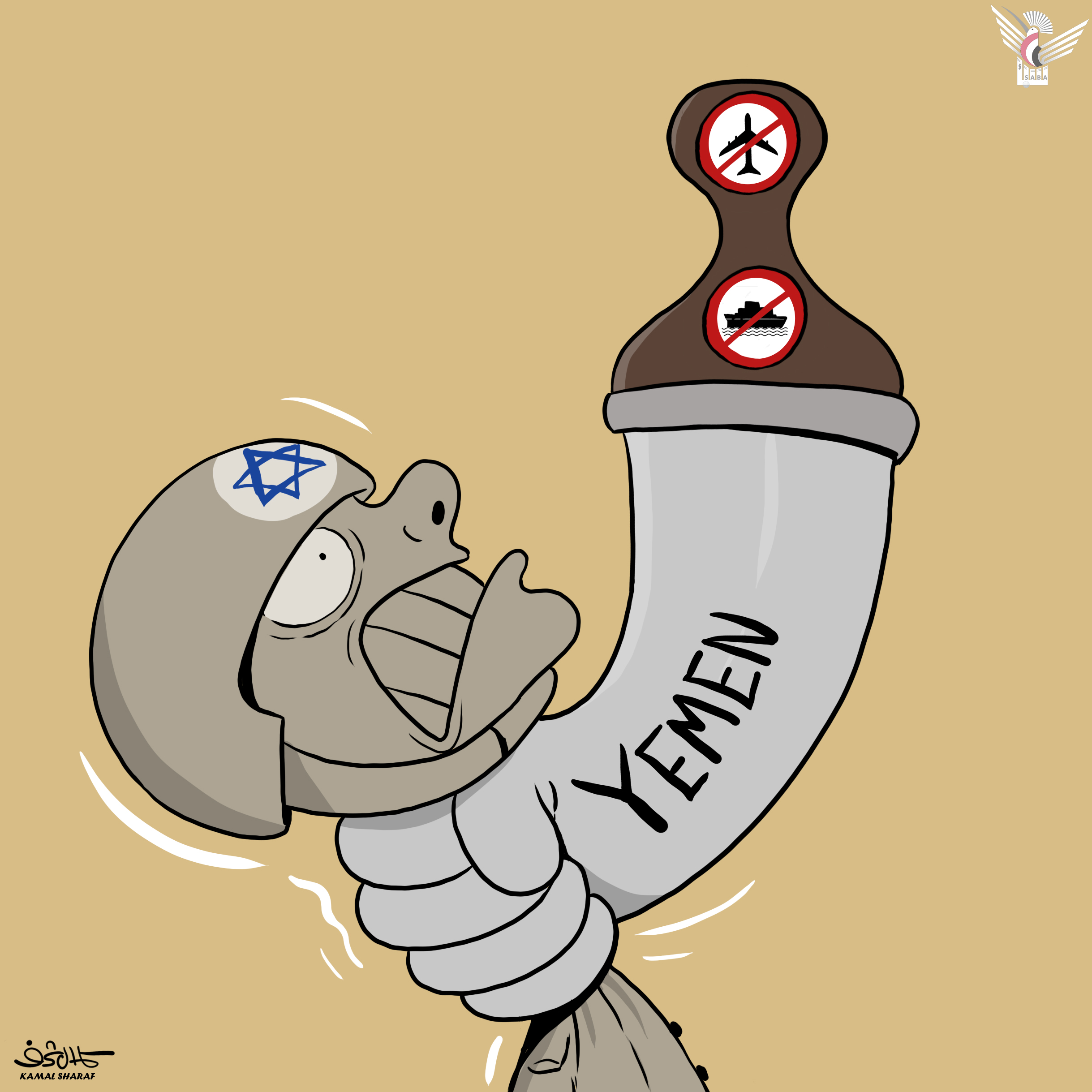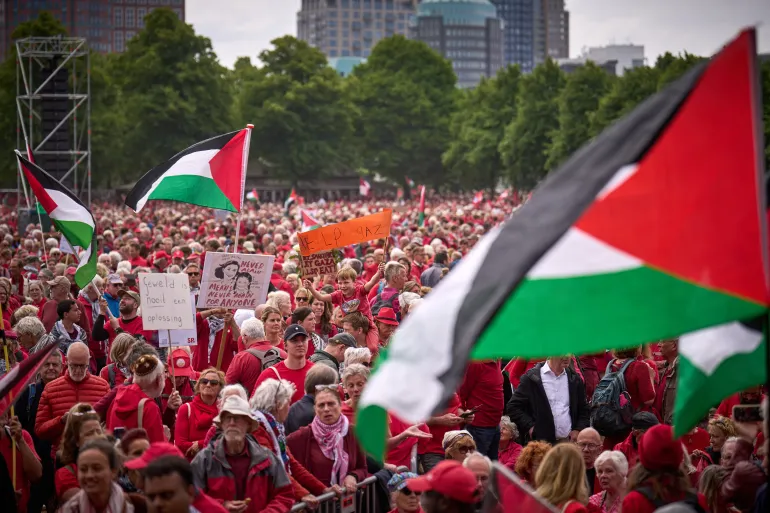Capitals - Saba:
Over the past few days, the European position has witnessed a broad solidarity movement at both the official and popular levels in support of the Palestinian people and condemnation of the ongoing genocide perpetrated by the Israeli enemy in the Gaza Strip.
The shift in European positions culminated when the leaders of Spain, Norway, Iceland, Ireland, Luxembourg, Malta, and Slovenia issued a joint statement calling for an end to the war in the Gaza Strip and a complete lifting of the blockade, they strongly rejected any plans for forced displacement or demographic changes in the Strip.
The statement stated, "We will not stand silent in the face of the humanitarian catastrophe being perpetrated by human hands, and occurring before the eyes of the international community."
The European leaders also warned that "more civilians could face starvation in the coming days and weeks unless immediate action is taken."
The seven leaders stressed the need to support the United Nations and UNRWA and ensure their safe and unconditional access to those in need inside the Gaza Strip.
In this regard, the Netherlands was the most vocal European country, taking a firm stance against the Israeli blockade of the Gaza Strip, it emphasized that continued violations threaten the Association Agreement with the European Union, Article 2 of which stipulates respect for human rights and democratic principles.
Dutch Foreign Minister Casper Veldkamp announced in a speech that his country had "drawn a line in the sand" in protest against the Israeli blockade of Gaza, which he described as "a violation of international humanitarian law."
He stressed that the "catastrophic situation in Gaza" calls for a discussion of future relations between the European Union and Israel, noting that Israel is not adhering to Article 2.
He noted that the Netherlands will suspend progress on any future plans with Israel and demand an urgent review as long as it continues to block humanitarian aid.
Veldkamp's comments received public support from European ministers, most notably Belgian Foreign Minister Maxime Prevost, who stated that "what we are witnessing is an absolute disgrace, and the European Union and the entire international community must wake up."
Finland also announced that it would demand a discussion of Article 2 if Israel continues to block aid.
Finnish Foreign Minister Elina Valtonen said, "The situation cannot get any worse. Israel has not allowed food shipments into Gaza for months, and under no circumstances should the suffering of the people be politicized."
She emphasized that Israel is legally and morally obligated to allow aid into Gaza.
Genocide
Spanish Prime Minister Pedro Sánchez described Israel as a "genocidal state," stressing that his country had "suspended trade with Israel" in protest of the situation in the Gaza Strip.
The European rejection did not stop with Sánchez, as French President Emmanuel Macron escalated his rhetoric against the Israeli occupation, calling in statements to the European Union to intensify pressure on Israel due to the deteriorating humanitarian situation in the Gaza Strip.
Macron pointed out that Europeans face an open question about whether discussions and cooperation agreements with Israel should continue in their current form.
Macron accused Israeli Prime Minister Benjamin Netanyahu, a war criminal, of adopting "unacceptable" and "shameful" behavior by obstructing humanitarian aid to Palestinians in Gaza.
Hunger as a Weapon
In contrast, French leftist MP Thomas Porte escalated his rhetoric against the occupation, threatening to bar the Israeli army's spokesperson from entering France, describing him as "the spokesman for an army of genocide." He said that his country "cannot allow this man to enter its territory, given the use of hunger as a weapon in the final stage of genocide in Gaza."
Italian Prime Minister Giorgia Meloni, for her part, described the humanitarian situation in Gaza as tragic and unjustifiable, noting the difficulty of talks with Netanyahu in light of the repeated violations of international humanitarian law.
This coincided with a UN report warning that the Gaza Strip was entering a "critical famine" phase, reflecting the scale of the humanitarian catastrophe. In the same speech, Berlin expressed deep concern about the situation in the Gaza Strip with Israel's announcement of expanding its offensive, considering that this threatens a further deterioration in the humanitarian situation.
The German Foreign Ministry warned in a statement that expanding the Israeli offensive could "endanger the lives of the detainees still in the Strip, including the German prisoners."
It added that a large-scale military offensive also carries the risk of further deteriorating the dire humanitarian situation of the Gaza population and the remaining prisoners, and with it, diminishing the prospects for reaching a permanent and urgent ceasefire.
Civilian Suffering
At the conclusion of the EU Foreign Ministers' meetings in Warsaw, Kaja Kallas, High Representative of the Union for Foreign Affairs and Security Policy, affirmed that most EU countries share deep concern about the deteriorating situation in the Gaza Strip, describing the situation as "unbearable."
Kallas warned that the Israeli military escalation would only exacerbate the suffering of civilians, stressing the EU's rejection of any demographic or territorial change in the region.
She also called for an end to the forced displacement of Palestinians, warning that such measures would only make matters worse.
Meanwhile, the leaders of the political groups in the European Parliament issued a joint statement expressing the solidarity of the leaders of the European People's Party, the Socialists and Democrats, Renew Europe, the Greens/European Freedom Alliance, and the Left parties with the Palestinian people regarding Israeli practices.
In a statement, the leaders of the political blocs in the European Parliament called for immediate and effective international action to alleviate the unbearable humanitarian crisis in Gaza, given the blockade imposed by the Israeli occupation, which prevents humanitarian aid from reaching civilians living in inhumane conditions.
Humanitarian Tragedy
In a significant development, European Council President António Costa expressed his shock at the escalating humanitarian crisis in the Gaza Strip, amid the Israeli occupation's expansion of its military operations.
Costa said in a statement, "I am shocked by the daily news coming from Gaza: civilians are starving, and hospitals are once again being bombed. The violence must stop!"
He called on the Israeli occupation to "lift the blockade immediately and ensure safe, rapid, and unhindered access for humanitarian aid." He added, "What is happening in Gaza is a humanitarian tragedy, an entire population is being subjected to overwhelming and disproportionate military force, and international law is being systematically violated."
These advanced political positions by European countries come at a time when several European cities and capitals have witnessed demonstrations denouncing the ongoing Israeli genocide against the people of the Gaza Strip for the 19th consecutive month.
Demonstrations
Thousands participated in demonstrations held in the French capital, Paris; the Danish capital, Copenhagen; the Dutch city of The Hague and Amsterdam; the British city of Manchester and the capital, London; Helsingborg and the Swedish capital, Stockholm; Geneva and Basel in Switzerland; Hamburg and Stuttgart in Germany; Berlin; and the Greek capital, Athens.
Participants in the demonstrations raised slogans demanding an end to military and political support for "Israel," imposing economic sanctions, banning exports to it, and holding the occupation's leaders accountable for the ongoing violations in Gaza.
The numerous statements made by European Union officials regarding the humanitarian situation in Gaza reflect a qualitative shift in official discourse, from silent complicity to a public warning to Israel that relations with Europe are no longer immune, and that the continuation of current policies, whether in Gaza or the West Bank, could lead to an unprecedented rift in the political and economic relationship between the two sides.
M.M

| more of (Reports) |




